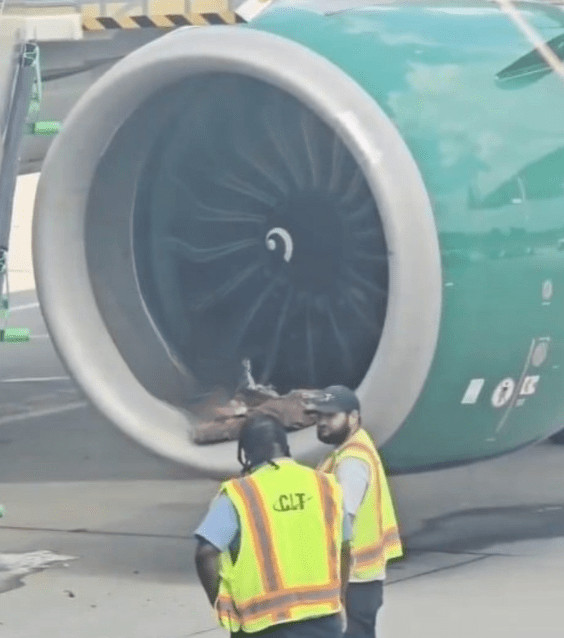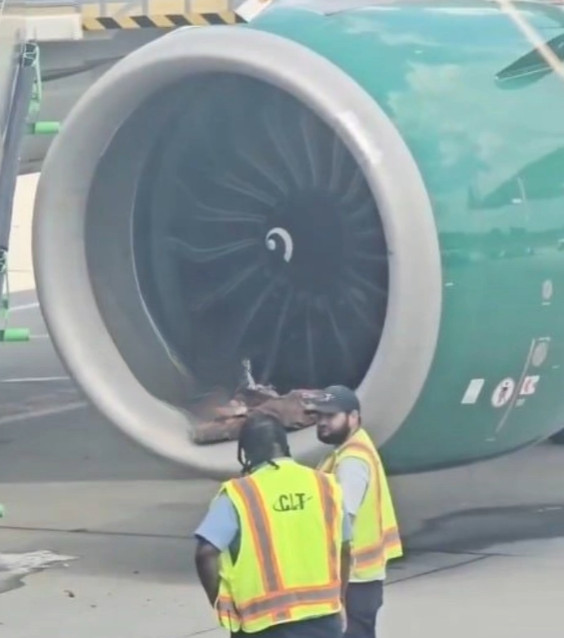Incident at Charlotte Douglas International Airport: A Wake-Up Call for Ramp Safety
On August 16, 2025, Charlotte Douglas International Airport witnessed a significant incident involving a Frontier Airlines Airbus A320. While it is fortunate that there were no injuries reported, this event laid bare critical vulnerabilities in airport ground operations. Passengers experienced substantial delays, and the incident has reignited discussions about the importance of strict adherence to safety procedures on airport ramps. The disruption was triggered by a ground air-conditioning hose getting caught in one of the aircraft’s engines, leading to immediate operational halts and extensive delays that would ripple through the airport.
The Sequence of Events
The specific aircraft involved, an Airbus A320neo with tail number N365FR, had just arrived from Philadelphia, completing Frontier flight F92387. It landed at approximately 10:25 AM, with plans to operate flight F93134 to New York’s LaGuardia Airport shortly after. In line with standard airport turnaround procedures, ground crews began connecting various utility systems to the aircraft, including an essential air-conditioning unit designed to maintain a comfortable cabin temperature for passengers boarding the flight. Such procedures are crucial for ensuring a pleasant flying experience, especially during warmer months.
However, in a concerning turn of events, the external air-conditioning hose was reportedly positioned too close to the aircraft’s operating engine. As the crew ignited the engine during routine pre-flight checks, powerful suction forces drew the hose into the engine, leading to its violent disintegration. This prompted an immediate shutdown of engine operations, instigating a comprehensive inspection of the aircraft to assess any potential damage. The incident quickly escalated into a broader procedural response involving maintenance and safety teams from Frontier Airlines, highlighting the need for immediate action in the face of operational hazards.

Passenger Impacts and Response
The ramifications of this mishap were significant for the passengers scheduled to board flight F93134. Many faced long delays, with some travelers reporting wait times nearing nine hours before a replacement aircraft could be arranged. Throughout the day, Frontier Airlines made efforts to keep affected travelers informed of the situation, as maintenance teams systematically assessed the original aircraft’s condition. While understandably frustrated, the passengers expressed an appreciation for the airline’s prioritization of safety over expediency, recognizing that thorough checks were necessary to prevent potential disasters. Frontier Airlines, which operates a fleet primarily comprised of Airbus A320 family aircraft, responded efficiently to the crisis. Airline representatives confirmed that no injuries had occurred and reiterated the airlines’ unwavering commitment to passenger safety. They worked diligently to accommodate affected travelers on alternate flights while ensuring that the original aircraft was not returned to service until all necessary assessments were completed. This careful approach underscored the importance of taking a proactive stance in crisis management, particularly in an industry where passenger safety is of utmost importance.
Broader Implications for Aviation Safety
This incident serves as a stark reminder of the complexities and safety requirements surrounding ground operations within the aviation industry. Ground equipment accidents, while infrequent, pose recognized risks that can lead to severe consequences. The Federal Aviation Administration (FAA) and the International Air Transport Association (IATA) have established comprehensive guidelines designed to mitigate these risks. These guidelines incorporate strict regulations regarding equipment placement, engine operational awareness, and effective communication protocols between ground crews and flight staff. Such measures are critical to maintaining safety on the ramp. Moreover, the necessity for ongoing training and supervision for ground personnel cannot be overstated. Continuous education ensures that employees are well-versed in safety protocols and can effectively respond to unexpected situations. The rapid actions of the aircraft crew in shutting down the engine and conducting an immediate assessment undoubtedly prevented a more serious incident from escalating, illustrating the impact of thorough training and adherence to established safety measures.
Industry Reflections and Lessons Learned
As the aviation community reflects on this incident, it is essential to recognize the importance of collaboration among airlines, airports, and regulatory authorities. Such partnerships can enhance ramp safety and streamline emergency responses when challenges arise. Experts suggest that the event at Charlotte Douglas International Airport should serve as a case study for future training and operational protocols within the aviation sector, emphasizing the need for shared responsibility and accountability across all stakeholders involved in air travel. Key takeaways from this incident include the necessity for heightened awareness during engine start procedures, ongoing training for ground crews, and the importance of establishing clear communication channels. Airlines must prioritize timely updates to passengers during delays, as effective communication can help manage frustrations and reinforce the commitment to safety. Ultimately, it is this proactive approach that will solidify a culture of safety and vigilance in the aviation industry.
Conclusion: A Commitment to Safety
The incident involving Frontier Airlines at Charlotte Douglas International Airport serves as a vital reminder of the complexities and safety demands of modern air travel. In an industry where safety is paramount, the effective response to this event underscores the importance of rigorous adherence to established protocols. As Frontier Airlines continues to investigate the circumstances surrounding the Airbus A320, there is a collective expectation within the industry that lessons learned will contribute to enhancing the safety culture moving forward. Ultimately, while passengers may find themselves frustrated by delays, it is crucial to recognize that these inconveniences often stem from safety measures functioning as intended. The aviation industry is poised to evolve, with a steadfast commitment to ensuring that ground operations remain as secure as the flights themselves. This event reinforces an essential truth: in aviation, safety must always take precedence over convenience, and every measure taken towards safety contributes to a more secure travel experience for all.

















